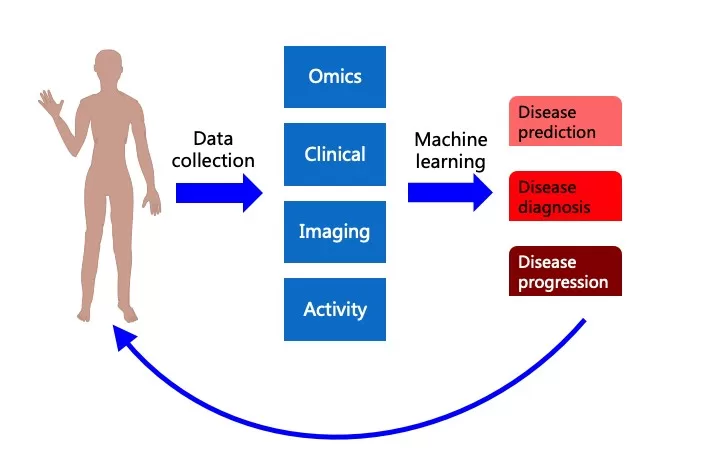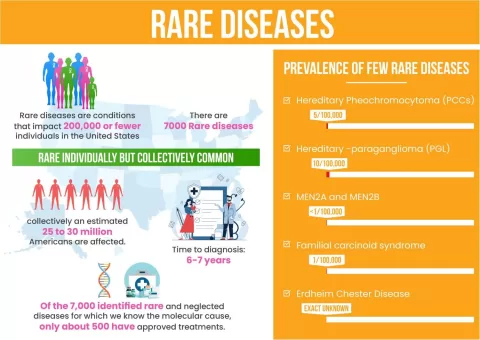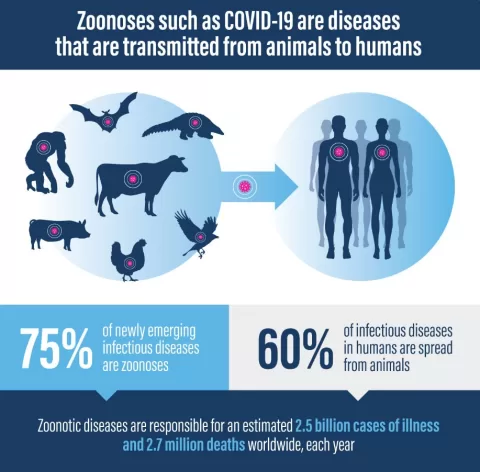AI in autoimmune disease prediction is revolutionizing the way we understand and manage these complex conditions. Traditionally, autoimmune diseases display a range of vague preclinical symptoms that often hinder early diagnosis, but advancements in artificial intelligence health technologies offer a promising solution. By utilizing predictive analytics in autoimmune studies, researchers can develop frameworks that accurately gauge disease progression. A groundbreaking model introduced by the Penn State College of Medicine significantly enhances predictive accuracy, leveraging data from genetic studies and health records to create a Genetic Progression Score (GPS). This innovative approach not only supports early diagnosis of autoimmune diseases but also facilitates tailored interventions, potentially altering the treatment landscape for millions of affected individuals.
Harnessing machine learning techniques in the realm of autoimmune disease detection marks a pivotal evolution in healthcare. Known as predictive modeling, this methodology enables clinicians to foresee the likelihood of disease advancement in patients displaying mild or preclinical symptoms. With the rapid integration of technology in medical diagnostics, tools designed to measure genetic susceptibility and symptom severity assist in assessing health risks more proficiently. The emerging trend of employing AI to analyze vast datasets paves the way for personalized medicine, ensuring individuals receive timely interventions tailored to their unique profiles. Ultimately, such transformative approaches can enhance outcomes and improve lives, highlighting the critical role of technology in the future of autoimmune disease management.
Understanding Autoimmune Disease Progression
Autoimmune diseases encompass a wide range of disorders in which the immune system erroneously attacks healthy cells. This can lead to significant long-term damage and a progressive decline in health. Typically, the progression of autoimmune diseases can be subtle in the early stages, characterized by vague symptoms or the presence of specific markers in blood tests. The preclinical phase often goes unnoticed, making early diagnosis an essential aspect of management. Understanding the different stages of autoimmune disease progression empowers both patients and healthcare providers to intervene at critical junctures.
Moreover, comprehending the progression pathways of autoimmune diseases is integral in tailoring individualized treatment plans. For instance, genetic variations may dictate how aggressively a disease progresses or how a patient responds to therapy. By leveraging predictive analytics in autoimmune studies, researchers can help in identifying those at high risk of progression, allowing for timely treatment and better management of their health.
The Role of AI in Autoimmune Disease Prediction
Artificial intelligence (AI) plays a transformative role in predicting the progression of autoimmune diseases. By analyzing vast datasets, including electronic health records and genetic information, AI can identify patterns that may not be immediately obvious to human researchers. The newly developed Genetic Progression Score (GPS) is a prime example of how machine learning algorithms can enhance predictive accuracy by evaluating risk factors and genetic markers across patient populations. Thanks to such advancements, the model’s ability to predict the transition from preclinical to clinical stages is significantly improved.
Bringing AI into the realm of predictive analytics for autoimmune diseases focuses on harnessing historical patient data and genomic insights to forecast future health outcomes. The application of AI not only assists in identifying individuals who may be on the brink of progression but also helps clinicians decide on the most effective course of action. By connecting early diagnosis with predictive analytics, healthcare systems can offer more targeted interventions, ensuring patients receive the care they need before irreversible damage occurs.
Genetic Progression Score: A Game Changer
The Genetic Progression Score (GPS) is revolutionizing the understanding of autoimmune disease transitions. Developed by a research team, GPS utilizes concepts from transfer learning to refine its predictions of disease progression. This method allows the model to leverage prior knowledge gained from larger datasets, effectively adjusting to focus on smaller, less studied patient populations. As a result, GPS not only highlights those at risk but also integrates vital genetic and clinical data to facilitate more personalized healthcare approaches.
By employing GPS, researchers have achieved unprecedented predictive accuracy when determining who is likely to progress from the preclinical to clinical stages of autoimmune diseases like rheumatoid arthritis and lupus. This capability is instrumental in clinical settings, where understanding the course of an autoimmune disease can lead to the development of personalized treatment strategies. Moreover, as clinical trials continue to strive for diversity, GPS can aid in identifying underrepresented patient populations that may benefit from tailored therapies.
Early Diagnosis: The Key to Effective Management
Early diagnosis of autoimmune diseases is crucial for effective management and treatment. Many patients experience a long delay before they receive a formal diagnosis, often due to the subtlety of early symptoms. AI-driven methodologies, such as those analyzing preclinical symptoms, can drastically shorten this timeline by accurately identifying at-risk individuals. By focusing on those presenting with initial symptoms, healthcare providers can offer timely interventions that may slow disease progression and improve overall outcomes.
Additionally, the integration of predictive analytics in clinical practice supports healthcare providers in recognizing warning signs earlier in the disease process. With tools like GPS, clinicians can determine which patients are likely facing significant risks and take preventative measures before irreversible damage occurs. This proactive approach to managing autoimmune diseases not only facilitates better patient outcomes but also reduces the long-term costs associated with advanced stage treatments.
Broadened Insights: AI and Health Disparities
AI in autoimmune disease research doesn’t just enhance clinical prediction accuracy but also addresses health disparities across diverse populations. By employing machine learning techniques, such as transfer learning, researchers can analyze underrepresented groups that traditionally lack robust medical literature. This contributes to a more equitable understanding of how autoimmune diseases affect different demographics, allowing for customized healthcare interventions that cater to various needs.
In many cases, specific groups face challenges in receiving adequate health information and treatment. AI solutions, such as those focusing on genetic and environmental factors, provide insights that can inform better healthcare policies. This is fundamental for efforts aimed at minimizing health inequities and ensuring that every patient receives appropriate care, irrespective of their background. Consequently, understanding how various factors influence the progression of diseases becomes paramount in advancing health equity.
Predictive Analytics and Its Implications
Predictive analytics serves as a cornerstone in the fight against autoimmune diseases, adding layers of understanding to traditional clinical practices. By utilizing advanced data analysis techniques, healthcare professionals can identify patients who are likely to experience severe disease progression based on genetic markers and clinical presentations. This foresight empowers clinicians to apply interventions that can mitigate adverse outcomes, fostering better management strategies.
Furthermore, the implications of predictive analytics extend beyond individual patient care. By analyzing aggregated data trends among various patient populations, researchers can uncover common pathways and risk factors contributing to autoimmune diseases. Establishing these links not only aids in refining the GPS methodology but also enhances preventive measures aimed at high-risk groups, ultimately working toward reducing the incidence and severity of autoimmune conditions in the population.
AI Ethics in Autoimmune Disease Research
As the integration of AI into healthcare progresses, the ethical considerations surrounding its use in autoimmune disease research become increasingly critical. Addressing issues such as data privacy, algorithmic bias, and informed consent is paramount when utilizing machine learning models to analyze sensitive patient information. Ethical AI practices ensure that the implementation of these technologies not only upholds patient rights but also guarantees equitable access to predictive tools across diverse populations.
Moreover, establishing ethical guidelines surrounding the use of AI in medicine will be essential for fostering trust between patients and healthcare providers. Transparency in algorithms, the benefits and risks associated with AI-driven predictions, and clear communication to patients regarding their data’s use are all critical components. Proceeding with an ethical framework will cultivate an environment in which both advancements in AI technologies and patient welfare can coexist harmoniously.
The Future of Autoimmune Disease Management with AI
The future of autoimmune disease management is poised to be dramatically transformed by advancements in AI. As models such as the Genetic Progression Score evolve and improve, the potential for precision medicine tailored to the unique needs of each patient grows. This paradigm shift emphasizes early diagnosis, proactive treatment options, and continuous monitoring, all of which hinge on robust predictive analytics and AI capabilities.
Additionally, ongoing research focused on understanding the genetic and environmental triggers associated with autoimmune diseases will help shape the next generation of therapeutic solutions. By harnessing the power of AI to analyze vast amounts of data, researchers will not only improve patient outcomes but also pave the way for groundbreaking discoveries in the field of autoimmune disorders, fostering a future where diseases can be not just managed but effectively prevented.
Collaboration and Research Advancements in Autoimmune Disorders
Collaboration among researchers, clinicians, and technology experts is vital in advancing the understanding and treatment of autoimmune disorders. Collaborative efforts lead to a richer pool of data and insights, facilitating more accurate predictive analytics. By joining forces, the healthcare community can tackle the complexities inherent in autoimmune diseases, paving the way for cutting-edge research methodologies that improve patient quality of life.
Moreover, shared knowledge among diverse disciplines amplifies the impact of innovative approaches, such as the incorporation of AI in clinical practice. As academic institutions, healthcare providers, and tech firms unite their efforts, the ability to develop and disseminate new findings on autoimmune disease prediction and management will accelerate. This, in turn, promises not only to enhance understanding of disease mechanisms but also to drive forward-thinking treatment strategies.
Frequently Asked Questions
What role does artificial intelligence play in autoimmune disease prediction?
Artificial intelligence (AI) plays a significant role in autoimmune disease prediction by utilizing predictive analytics to analyze extensive data sets from genetic studies and electronic health records. AI models enhance the accuracy of forecasting disease progression, particularly in individuals showing preclinical symptoms, improving early diagnosis and intervention methods.
How does the Genetic Progression Score (GPS) assist in predicting autoimmune disease progression?
The Genetic Progression Score (GPS) is a novel AI-driven method designed to assess an individual’s risk of transitioning from preclinical stages to full-blown autoimmune disease. By integrating data from case-control genome-wide association studies and biobanks, GPS enhances the predictive accuracy of who may develop the disease, allowing for timely interventions.
What importance does early diagnosis have in autoimmune disease management aided by AI?
Early diagnosis, facilitated by AI in autoimmune disease prediction, is crucial as it allows for timely treatment and better management strategies. Intervening at the preclinical stage can reduce the risk of irreversible damage caused by the progression of autoimmune diseases, ultimately improving patient outcomes.
How can AI contribute to reducing health disparities in autoimmune disease prediction?
AI can reduce health disparities in autoimmune disease prediction by leveraging transfer learning to study underrepresented populations that are often overlooked in medical research. By accurately predicting disease progression in these groups, AI helps ensure equitable access to early diagnosis and effective treatment options.
What advancements in predictive analytics are changing the landscape of autoimmune disease diagnosis?
Advancements in predictive analytics using AI technologies are changing autoimmune disease diagnosis by providing more accurate forecasting tools, like the Genetic Progression Score. These methodologies analyze large datasets to identify patterns and risk factors, leading to enhanced early detection capabilities and personalized treatment plans.
How accurate is AI in predicting the progression of autoimmune diseases compared to traditional models?
AI models have shown to be between 25% and 1,000% more accurate in predicting the progression of autoimmune diseases compared to traditional models. This increased accuracy is due to their ability to analyze vast amounts of data and identify subtler markers of disease progression not captured by conventional methods.
What data sources are utilized in AI models for autoimmune disease prediction?
AI models for autoimmune disease prediction utilize a variety of data sources, including electronic health records, genetic studies from biobanks, and case-control genome-wide association studies (GWAS). These diverse datasets allow for a comprehensive analysis leading to accurate risk assessment.
Can AI help in personalizing treatment options for autoimmune diseases?
Yes, AI can significantly aid in personalizing treatment options for autoimmune diseases by identifying individuals at high risk of disease progression. Through predictive analytics, AI enables healthcare providers to tailor interventions and monitor treatments more effectively, improving overall patient care.
What future implications does AI in autoimmune disease prediction have for healthcare?
The future implications of AI in autoimmune disease prediction for healthcare include enhanced diagnostic accuracy, more effective treatment strategies, and improved patient management. As AI continues to evolve, it holds the potential to revolutionize early detection and intervention in autoimmune diseases, leading to better health outcomes.
How does machine learning influence the accuracy of autoimmune disease predictions?
Machine learning influences the accuracy of autoimmune disease predictions by processing and learning from complex datasets to identify risk patterns. Advanced algorithms refine predictions based on real-world evidence, leading to more reliable assessments of who may progress to severe disease stages.
| Key Point | Details |
|---|---|
| AI Model Development | A new AI model predicts progression in autoimmune diseases more accurately by analyzing electronic health records and genetic studies. |
| Importance of Prediction | Predicting progression can lead to early diagnosis, better treatment options, and improved management of autoimmune diseases. |
| Uses of Genetic Progression Score (GPS) | GPS integrates data from genome-wide studies and biobanks to refine risk scores for transitioning from preclinical to clinical disease stages. |
| Impacts of Findings | Higher accuracy in predictions can facilitate targeted monitoring and personalized treatment, improving overall patient outcomes. |
| Broader Application of Research | The framework developed could be utilized for other diseases and to study underrepresented populations in medical literature. |
Summary
AI in autoimmune disease prediction plays a crucial role in identifying individuals who are likely to progress from preclinical symptoms to severe disease stages. This research highlights the significant advancements in predicting autoimmune disease progression, leveraging AI models that analyze extensive genetic and health record data to provide personalized treatment approaches. Early detection through such AI technologies promises to enhance patient outcomes and relevant healthcare strategies.
The content provided on this blog (e.g., symptom descriptions, health tips, or general advice) is for informational purposes only and is not a substitute for professional medical advice, diagnosis, or treatment. Always seek the guidance of your physician or other qualified healthcare provider with any questions you may have regarding a medical condition. Never disregard professional medical advice or delay seeking it because of something you have read on this website. If you believe you may have a medical emergency, call your doctor or emergency services immediately. Reliance on any information provided by this blog is solely at your own risk.







